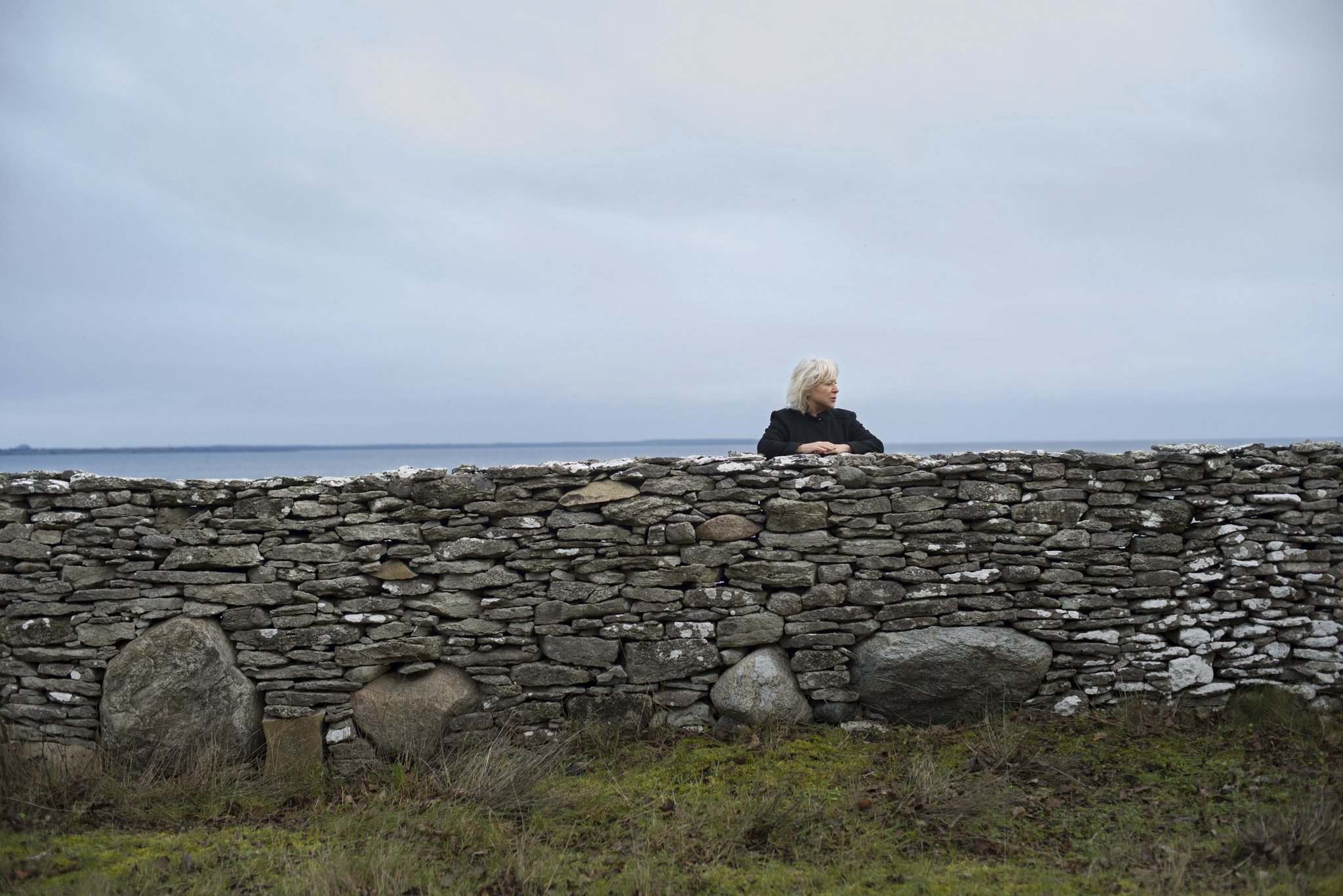Margarethe von Trotta is on the phone from Paris, where she resides. At age 76, she has a distinctive voice – mellifluous, warm, and deep, her sentences frequently punctuated with a low chuckle. Von Trotta is one of the great filmmakers of her era, a leading voice of the new German cinema (a movement influenced by the French Nouvelle Vague) that included Rainer Werner Fassbinder, Werner Herzog, Volker Schlöndorff and Wim Wenders.
She has also been described as “one of the most important feminist filmmakers in the world.” For many years, von Trotta refused to be ghettoized as someone who made “women’s films.” Instead, she took up her rightful place alongside her male colleagues as a filmmaker and writer, who was committed to exploring the female psyche. To date, she has made over 20 films, including some for television, and is going strong.
Which brings us to Searching For Ingmar Bergman, a documentary about her mentor, created for the 100th anniversary of Bergman’s birth. Von Trotta couldn’t attend TIFF as she is receiving a prestigious prize, the “Theodor W. Adorno Award,” named after the German philosopher.
“It’s a very important award,” says von Trotta. “And I’m only the second woman to receive it. (The first was Judith Butler in 2012).” She chuckles. “Before it was always men, yeah.” Von Trotta is also the second filmmaker recipient, after Jean Luc Godard.
She is accustomed to being the only woman in a group, including her inclusion on a list Bergman made of his favourite filmmakers, alongside Fellini and Bresson “Yes, I was the only woman on the list! And the only one who is still alive! Therefore, that was a little bit of a reason to make the film. And Bergman himself is dead. I feared a little bit that it will be a bad omen, but, on the other hand,” she chuckles, “we have not to be superstitious.”
Seeing Bergman’s work is what inspired her to become a filmmaker. “In the 50s, with my mother, we didn’t go to the cinema, we went to theatre, opera, concerts, art. Film was not in our, you know, interests, because there were not so many films that were interesting in Germany. And when I went to Paris to study, I met some French students and the Nouvelle Vague, the new wave of French cinema, was starting in ’58 ’59. They were interested by this new phenomenon of cinema and said to me, ‘I have to go with them to see films.’”
In Paris, she saw Bergman’s brilliant The Seventh Seal, about a medieval knight playing chess with Death in order to save his life. “I was so shocked, it was like, how do you say, summer lightening for me to see this film.” Deep down, she wanted to become a filmmaker. But “I didn’t say it aloud, because that was unthinkable at this time, that a woman could do film, apart from Leni Reifenstahl [who worked with Hitler to make Triumph of the Will in 1934], but she was not a woman to imitate. So I couldn’t imagine that there would be a chance for a woman to do a film. When the German New Wave started in ’65, it was like destiny.”
Von Trotta found her way in as an actress, including appearing in three films with Fassbinder and six with Schlöndorff, who would become her second husband. It was with Schlöndorff that she was able to gather practical experience.
“Because we were married, and I was with him for every film, I was sitting in the cutting room all the time, much more than he did. So I learned by looking at films, and by asking the directors I was working with. I was interested in how they did the film. So, that was my school. I learned by doing, let’s say, and mainly by observing.”
In 1975, she and Schlöndorff made The Lost Honour of Katharina Blum together, but only her husband signed it as director. The film launched Schlöndorff’s career, but it would be three years before von Trotta wrote and directed her own film, The Second Awakening of Christa Klages in 1977. “And then I never acted again. My aim was to be a director and not an actress, so I gave up totally acting when I made my first film.” Acting, she realizes now, was “an unconscious strategy” to become a director.
As to how acting influenced her as a director, she says simply, “Maybe it helped me. I was able to give help to my actresses, more than perhaps a director who never was in front of the camera. When I teach in film schools now, I teach directing of actors. I always say to the students who want to become directors, ‘you have to be in front of the camera [at least once], because it [gives you] such a different feeling. You feel so much more exposed [and] you have to know how that feels.”
And what was her experience like, as a woman, moving from in front of to behind the camera? “That was very welcome for me,” she says. Moving from “the one to get orders to be the one to give orders,” as she puts it, allowed her to express herself in her own way, even though, she points out, she was “never dictatorial. I never gave orders like some of my male colleagues.”
Von Trotta was a pioneering woman, not only as a director, but in her portrayals of women’s lives. “When I started, there was only Agnès Varda. I saw a film of hers in Paris, Cléo de 5 à 7, but she was not really somebody who I looked [to as] at an example. But then, in the early ‘70s, I saw a film by Barbara Loden, Wanda. Loden was an actress, married to a director, Elia Kazan, so she was an example for me, because I was still married to Volker Schlöndorff. I was an actress married to a director, wanting to make her first film, and she did it. She did it wonderfully. Unfortunately she died. I think she would have made a really good career as a woman filmmaker.”
I bring up the concept of “the female gaze”. “Well, I think from the beginning, that was my aim, not to use these glamorous actresses, but to go into the profound existence of their souls. Not only to look at beauty.“
“Can a man have a female gaze,” I ask? Bergman’s name occasionally comes up with this question, because he really focused on women. Von Trotta recalls being selected by him to be on a film jury, and having a discussion about something of concern to her. “I was doubting if he could understand the special problem I had,” says von Trotta, “and he said, ‘But Margarethe, I understand everything, because I am like a woman. I feel like a woman.’” She laughs. “I think he had this openness to women, he portrayed women like real human beings. Even though they are all beautiful (and) he was still looking as a man.” As Liv Ullman observes in the documentary, Bergman identified with his female characters to the point, she realized, that she was portraying him onscreen.
“Now with the Me Too Movement,” says von Trotta, “there are so many who have said he was a womanizer, and he was cruel, and so on, but I spoke with Liv Ullman, and she said he was never violent, he was always very respectful and very nice. So, what can I say?”
Given that Bergman was an icon for her, was there anything she discovered that changed her view of him? “You know, to make a film about your master…I wouldn’t have dared to have the right to make a film about him. But the producers were pushing me. And then I went to Stockholm to the Bergman Foundation, and I said to them, ‘What can I do that was not already done, and written, and filmed? He is so famous that everything was already made about him.’ Make it more personal,” they said. “You knew him, and he liked you. And speak about Munich.”
Bergman had fled Sweden for Munich in 1976, due to tax problems, and lived there for seven years. Von Trotta was also living there, with Schlöndorff, at the time. “I was never before so interested in him as a man. I saw his films and this was what I wanted to see, his films, and not to know so much, from his family, and women. And now [for this film], I had to look a little bit closer. And I had the opportunity to speak with his son, Daniel, and that was very eye-opening.”
The sequence with Bergman’s son, Daniel, who is also a filmmaker, is riveting. Not surprisingly, Bergman was not a great father. I suggest that von Trotta’s focus on the conflict between being an artist and a parent seemed to me a particular example of a woman’s gaze, because it’s a question women frequently struggle with. And von Trotta focused on it for quite awhile in the film. Was this a conflict she also had experienced?
“Yeah, sure, sure,” she says, then adds that Bergman’s son had always refused to do interviews before. “With me, he knew my films, so he was very open. But his situation was that both mother and father were artists. His mother was a pianist, so she was away too. And I was away. I have a son, who made the film with me, by the way. And so, I had that problem too, when I started to make films, when he was still [somewhat] young.”
Von Trotta co-directed the film with Felix Moeller, her son from her first marriage, now a successful documentary filmmaker. It was Moeller who also encouraged her to go ahead with the film, and she agreed to do so if he came on board. “He did several documentaries that were shown in New York, and he had a review on the front page of the New York Times. I never had that,” she laughs. Von Trotta credits both Moehller and her editor, Bettina Böhler, as co-directors. “Without them, as a normal filmmaker and not a documentarist, I would have been lost, I think.”
This was von Trotta’s first documentary, and is likely her last. How was the process of filmmaking different? “It’s terrible,” she exclaims. “You never know what people will say and (although) I was always very prepared, I couldn’t give them directions of what to say, or where to go. Where to sit, that’s the only thing I could do. No, I’m really not a documentarist.”
If she were to make another documentary, I wonder, would it be about Fassbinder? “Oh no. There are already films [about him but] made by others. No, I’m not…” she laughs, then pauses, to consider. “I would make a film about a woman, not another man. The Italians, for instance, Lina Wertmuller and Liliana Cavani. They are not feminists but they were making films in Italy earlier than I was.”












